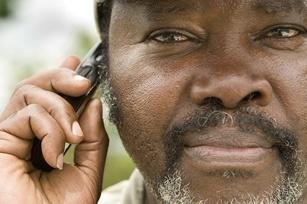Profiling Taj Onigbanjo - the driving force behind new African business development and client relations at Cable & Wireless.
Taj Onigbanjo is Head of the Middle East & Africa (MEA) operation at Cable & Wireless Worldwide, with responsibility (in his own words) for "setting the strategy, driving the objectives and managing the sales channel". Taj regards his principal attribute as the ability to communicate, to connect with his clients and co-workers. Meeting Taj leaves you with no doubt that he easily earns the respect and confidence of those he works with.
Commercial growth through revenue generation and strategic account management are what matter to Taj Onigbanjo. With two decades experience in the telecommunications industry to his name, relationship management and business development are in his blood. Go further back in time, and Taj reveals an education steeped in the disciplines of business administration and mass communication. He even managed the college jazz radio station and worked at the newsroom of the local NBC station whilst gaining his masters degree at Tennessee State University in the USA.
Cable & Wireless’ involvement in investment in African market stretches back to the provision of some of the first submarine cables more than 100 years ago. More recently, Cable & Wireless has been investing in fibre to connect Africa to Europe, specifically through the West Africa Cable System, which has been designed to deliver 3.84Tbps backbone connectivity, actually connecting more than 13 countries including Namibia, The Democratic Republic of the Congo, The Republic of Congo, and Togo. Running MEA affairs at Cable & Wireless since March 2008, Taj tackles the African market head on, engaging with global organisations with African interests and operations as well as African-based communications enterprises seeking true international connectivity.
Describing Africa as a "hot spot" for international growth, Taj Onigbanjo is keen to stress that Cable & Wireless has, through its partnerships with other industry players, demonstrated a commitment to developing the infrastructure needed for international and local businesses to grow. With respect to next generation communications and how that might support the transformation of African economies into 21st century business hubs, Cable & Wireless are involved in the WACS cable project because it is designed to enable communications cost reductions and an easier path to up-scaling bandwidth. WACS empowers, also, Cable & Wireless to deploy its own Points of Presence (POPs), to support the rollout of next-generation services such as Multi Protocol Label Switching (MPLS).
Building relationships with systems Integrators
In interview with Communications Africa/Afrique, Taj Onigbanjo spoke of the myriad opportunities available in African markets for voice, data, hosting and contact centre solutions. He spoke, also, of his role in the promotion of new ideas and initiatives to benefit all parties in any arrangement, to "help develop, strengthen and deepen the relationship". Cable & Wireless is a global telecommunications firm with strong African aspirations. Particular regard has been paid to the Nigerian marketplace, where "focus, knowledge and experience" count for success. Taj is based In Nigeria, a "fairly developed market" with roughly 55mn mobile subscribers and still less than 50 per cent penetration. However, the company also sees Kenya, Angola, and Uganda as its next high growth markets. And it is encouraging enterprises around the world as well as within the continent to take a fresh look at the new, connected Africa, where partnerships can lower connectivity costs, where undersea cable operators can be encouraged to work together to ensure the delivery of effective services to their customers. Taj Onigbanjo sees a commercially-minded continent geared towards optimal use of information and communications technologies - not for development alone, but to develop more business - where telecommunications operators share infrastructure wherever possible to support diversified and resilient economies. Indeed, Taj was able, recently, to cite an example of how such collaboration can work. He noted that Seacom recently acquired capacity on the SAT-3 cable, after its own cable was affected by a repeater fault early in July 2010.
Demand for capacity is rising. Increasing numbers of people are using their mobile phones to connect to the Internet. Fibre cables are essential to connect the continent to the rest of the world, and to connect the continent's countries to each other. Cables, forming the core of an African terrestrial backbone, are not a luxury; they are a necessity for African growth in an increasingly globalised, increasingly connected and increasingly competitive planet. The challenge for African enterprises, in telecommunications as in other areas of commercial concern, is to ensure sustainability. The unique challenge to operators is to ensure quality access to connectivity at affordable prices, across distinct, different markets, each with their own challenges. Taj Onigbanjo leave one with a strong impression that he truly believes operators can benefit by expanding into new markets, connecting countries and business communities in the Middle East and Africa. These are, after all, the largest telecommunications growth regions in the next five years.
There is just one note of warning. Whilst African telecommunications markets represent "huge" opportunities for growth, they also represent significant investment risks in one regard. Onigbanjo stresses that, whilst voice and data traffic across Africa may be expected to continue to grow, the average revenue per user (ARPU) may be expected to decrease. He advises telecommunications operators to manage capacity carefully, for optimal operation, and seek to avoid loss of revenue through price wars.
If such caution can be observed, Africa will be better prepared to do business with the rest of the world, and Africans will be able to engage in commerce on a bigger and better scale with their neighbours. We leave the final word on opportunity with Taj Onigbanjo, who says that Cable & Wireless has invested in high-speed, high-capacity and cost effective telecommunications networks, improving infrastructure for business by building on existing telecoms capability in the region, precisely because international bandwidth capacity into sub-Saharan Africa will be beneficial to all of Africa through real–time access to global information, resources and market opportunities.





















